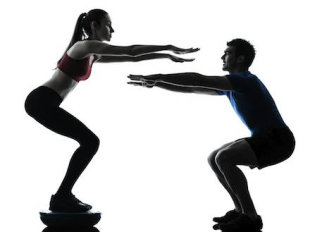Bosu Squats
What you think bosu squats do: Most people who do bosu squats believe that they give your core a more intense workout compared to the traditional squat.In reality… bosu squats don’t activate your core any more than a traditional squat. Evidence for this emerged from a study undertaken by researchers at the Eastern Illinois University and published in the International Journal of Sports Physiology and Performance.
The study examined 12 participants who performed exercises on both stable ground and on a BOSU Balance Trainer. The researchers concluded that there were no advantages to be had from using the BOSU Balance Trainer and that exercising on stable ground was just as effective.
So, if you want to engage your core, bin the bosu squats and instead stick to the traditional method.
Low intensity exercise
What you think low intensity exercise does: Most people have been led to believe that low intensity exercise helps you to burn more fat and will therefore help you to lose more weight, compared to if you performed exercise at a high intensity.
In reality…performing an exercise at a low intensity – such asdoing some light swimming or doing a yoga session – does not help you to lose more weight.
According to the myth, low intensity exercise helps you to lose more weight because when you work out at a low intensity your body fuels your training session by burning fat. However, weight loss depends on the total amount of calories you burn and the total amount of calories you consume. And when you exercise at a low intensity you burn less calories than you would had you worked out for the same length of time at a high intensity. Therefore, although you are burning fat when you do low intensity exercises, you will not burn as many calories, and therefore you will not lose as much weight as you would if you performed high intensity exercises.
Step exercises with ankle and hand weights
What you think doing step exercises with weights does: A lot of people believe that doing step or bench exercises with ankle or wrist weights will help them to tone their legs, arms and butts.In reality… exercising with ankle or hand weights doesn’t help you to improve your muscular fitness.
According to a study conducted by the Division of HPR-Exercise Science at Wayne State University, women who performed three 50 minute step exercise sessions with ankle and wrist weights per week had no more muscular fitness benefits from these sessions than those women who performed the exercises without the weights.
Crunches
What you think crunches do: If asked how they could achieve rock hard abs, most people would probably say that doing a zillion crunches every day would help them to achieve the defined six pack of their dreams.In reality… although not completely redundant, crunches are not the best way to get a six pack.
This is because although crunches can help to strengthen your abdominal muscles, in order to be able to see your six pack you need to lose the layer of belly fat that covers most people’s stomach muscles. And crunches won’t help you get rid of that belly fat.
Why? Well, you can’t target specific areas of your body, say by doing crunches, and actually lose weight from that specific part of your body. Instead, work on a weight loss program, doing a mix of cardio and strength training exercises. If you also eat correctly you should then begin to lose weight and as a result lose some belly fat. Once you’ve lost enough belly fat you should begin to see that six pack.
Ball slams
What you think ball slams do: Lots of people think that when they hurl their medicine ball to the ground they’re giving their core and arms a tough workout.In reality… ball slams actually provide more of a challenge for your back and your shoulders. According to Washington State University the main muscle ball slams work is your latissimus dorsi muscle (aka your lats), which is located on your back. Washington State University also state that ball slams work your deltoids too, which is a muscle found on your shoulder.
https://uk.lifestyle.yahoo.com/5-exercises-dont-think-080019804.html






